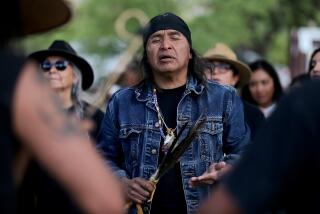A growing church vs. a growth-conscious county
- Share via
DENVER — When the largest church in Boulder County, Colo., wanted to double its size two years ago, county commissioners said no.
Rocky Mountain Christian Church already dominated a rural corner of the county northwest of Denver. If it became any larger, commissioners said, it would destroy the area’s country atmosphere.
But the church didn’t accept the decision quietly. Using a relatively new federal law meant to protect religious organizations from discrimination by local governments, church officials charged Boulder County with hampering their ability to practice their religion.
The county responded by calling the law unconstitutional because it prevented communities from controlling their growth and planning.
This month, the conflict reached a federal courtroom in Denver, where a jury will begin deliberating the case today.
Although such cases have cropped up around the country since the Religious Land Use and Institutionalized Persons Act was passed in 2000, legal experts say they rarely advance to the courtroom.
The Supreme Court has not heard a land-use case under the statute, but lower courts generally have ruled that the law is constitutional, said Patricia Salkin, associate dean and director of the Albany Law School Government Law Center in New York.
One issue, she said, is that the law says governments can’t place a “substantial burden” on the right to practice religion but doesn’t adequately define substantial burden.
Many cases have focused on whether a church can locate in a particular area, but the Boulder County case is one of the first to deal with the size of a religious institution, Salkin said.
In 2006, Rocky Mountain Christian Church announced plans to add a children’s wing, gymnasium, rooms for adult classes and 500 parking spaces. The expansion would have brought the church’s square footage to 240,000. The expansion was planned for land it owned in the county’s agricultural buffer between urban and rural areas.
Boulder County officials, known for aggressively preserving open space and rural land, agreed to a small expansion of the church sanctuary but denied the rest, calling it “completely out of character” with the area.
County officials pointed out that they had approved five expansion requests from the church over 10 years. This one “so clearly fell outside the regulations . . . that no entity or institution requesting such an expansion would’ve been approved,” county officials said in a statement.
The church already was the largest in the county -- as big as a local Wal-Mart -- with a 1,400-seat sanctuary, a school for 380 children, a gymnasium and parking for 775 cars, county officials said.
The church’s lawyer, Kathryn Hopping, said more than 2,000 people attended the church, but it could not hold banquets for more than 250 people and had to curtail adult classes.
“Holding classes in hallways -- substantial burden,” Hopping said. “Kids sitting on floors -- substantial burden.”
During the trial, church officials argued that the county commission was biased against them. They cited a planning commissioner’s comments about trying to keep the church from getting too big. They also said he remarked during a hearing: “You can bring in your Christians now.”
The church compared its expansion problems with the commission’s approval of a private secular school’s plans for a gymnasium, playing fields and buildings in 1996.
That school’s case was approved by a different set of commissioners, county attorney John Bauer said, and the expansion was much smaller than the church’s.
He said the church had offered no evidence of religious bias. County officials “approved applications in 1993, 1995, 1998, in 2001, and in 2003. Did they have anti-religious bias then?” Bauer asked.
Some churches claim discrimination so they can avoid the land-use process, said Marci A. Hamilton, a professor at Yeshiva University’s Benjamin N. Cardozo School of Law in New York. A critic of the law, she advises governments, including Boulder County, on how to handle such challenges.
Hamilton said the law was unnecessary because it was already unconstitutional to discriminate against a religious group.
But lawyer Eric Rassbach said the law gave an important tool to religious groups facing legitimate problems. Rassbach is the national litigation director for the Becket Fund for Religious Liberty, which is helping the church in its lawsuit.
“It tells municipalities . . . you have to care about religious exercise,” he said. “It doesn’t mean that a church gets to go to a county and say, ‘I get whatever I want.’ It does say the county has to figure out what’s the burden on religious exercise and how do I alleviate that?”
More to Read
Sign up for Essential California
The most important California stories and recommendations in your inbox every morning.
You may occasionally receive promotional content from the Los Angeles Times.













